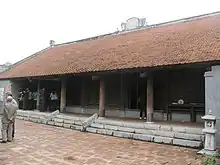

Dâu Temple (Vietnamese: chùa Dâu), also known under formal names: Diên Ứng (延應寺), Pháp Vân (法雲寺), and Cổ Châu, is a major Buddhist temple in Thanh Khương commune, huyện Thuận Thành, Bắc Ninh Province.[1] Located some 30 km east of Hanoi, the temple historically marks the ancient settlement of Luy Lâu, once an important center of Buddhism in Vietnam.[2] 500m farther away lies the Temple of Sĩ Nhiếp, the remarkable Chinese Governor of Jiaozhi at that time.
History
Both the pagoda and the temple date from the 2nd century with construction in 187-226 AD. The temple is the oldest documented Buddhist one in Vietnam. With Luy Lâu being an entrepot between China and India, Dâu Temple was the stopping point for both Northern (Mahayana) and Southern (Theravada) Buddhist pilgrims and monks.
Architecture
Dâu Temple consists of two small parallel structures and one even smaller on the right side. Architecturally, the Sĩ Nhiếp Temple (photo) contains a number of important buildings in Vietnamese Buddhist art. At the center is a large three-story brick tower named Hoa Phong, built in 1737. Other historical pieces include stone and wooden statuaries, a number of which predates the 10th century.
Temple festival
Dâu Temple hosts the annual temple festival with ritual offerings to Buddha and musical performances for the masses on the 8th of the Fourth lunar month, attracting large numbers of worshippers from all across the Red River Delta.
References
- ↑ "Vietnam tours, Vietnam travel news, Vietnam tourism news, Dau Pagoda - cradle of Vietnamese Buddhism". www.footprintsvietnam.com. Archived from the original on 2006-05-06.
- ↑ Catherine Noppe, Jean-François Hubert Art of Vietnam 2003 Page 53 "In the heart of the Bac Ninh plain in a region at the time known as Luy Lau - the region of the capital, Giao Chi - the beautiful Dau pagoda keeps the memory of the introduction of Buddhism around the end of the second or beginning of the third ..."
External links
![]() Media related to Diên-ứng Pagoda at Wikimedia Commons
Media related to Diên-ứng Pagoda at Wikimedia Commons